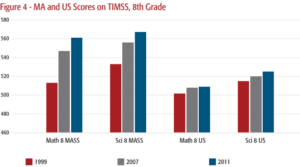Study Finds Results of International Assessments Confirm Quality of MCAS
Economist and Fulbright Scholar concludes Massachusetts should return to participating in international testing as a benchmark for state results and internationally competitive economy
BOSTON –Results from two international assessments Massachusetts students participated in between 2007 and 2015, as well as the Commonwealth’s scores on the National Assessment for Educational Progress (NAEP), confirm the accuracy of state MCAS exams, according to a new study published by Pioneer Institute. The results of both global assessments mirrored the improvement seen on MCAS between 2001 and 2015.
The study shows that Massachusetts’ scores were on par with the highest performing countries in the world and dramatically outperformed the U.S. as a whole.
“Across several years and subjects, the performance of Massachusetts students on international exams confirmed the quality of the Commonwealth’s K-12 public schools,” said Professor of Economics and Fulbright Scholar Ken Ardon, author of Student Achievement: MCAS and International Exams. “Those high-quality public schools attract workers, and well-educated graduates attract employers.”
Rising performance on tests also brings social benefits. Higher scores correlate with lower dropout rates, better college completion rates, less likelihood of requiring government assistance or committing crimes, greater likelihood of having a successful marriage and overall health.
The news comes on the heels of the news that the 2024 MCAS scores showed a significant decline across the state due to the pandemic.
“The MCAS has shown us that students across the state are struggling with learning loss right now which will have a domino effect on college and career readiness and ultimately the economy,” said Jamie Gass, Director of Education at the Pioneer Institute. “Professor Ardon’s study and common sense tells us that MCAS has been a useful tool in making Massachusetts academically competitive not only on across the state level, but internationally.”
Since 2008, English language arts (ELA) and math MCAS tests have been administered in grades 3-8, and 10, and Sci/Tech exams in grades 5,8 and 10. From 2001 (the first year 10th graders were required to pass MCAS tests to graduate from high school) through 2015, MCAS results generally improved over time. In 2008, passage of a Sci/Tech exam also became a graduation requirement.
During that period, strong MCAS performance correlated with Massachusetts students scoring ever higher on the NAEP assessments, again confirming that rising MCAS scores reflected real improvement.
Trends in International Math and Science Study (TIMSS) tests 4th and 8th graders from across the globe in math and science every four years. In addition to the U.S. participating, Massachusetts 8th graders participated as a separate entity in 1999 and 2011, and both 4th and 8th graders in 2007. The commonwealth’s 8th graders improved from 16th t0 6th in the world in math, and from 12th to 2nd in science from 1999 to 2011. State 4th graders ranked fourth in the world in math and second in science in 2011.
Every three years, the Program for International Student Assessment (PISA) tests 15-year-olds in math, science and reading. Massachusetts participated in 2012 and 2015.
In 2012, Massachusetts students placed 10th in math, seventh in science, and 4th in reading among 65 participants (mostly countries). The U.S. as a whole placed 30th, 23rd, and 20th, respectively.
In 2015, Massachusetts placed 12th in math and improved to second in science and first in reading out of 72 participants. The U.S. overall placed 31st, 41st, and 45th, respectively.
Beginning in 2017, Massachusetts changed the MCAS exams to reflect new state standards. The change makes it more difficult to compare pre- and post-2017 results.
Ardon recommends that Massachusetts rejoin TIMSS, PISA or both to provide an international benchmark for MCAS results.





